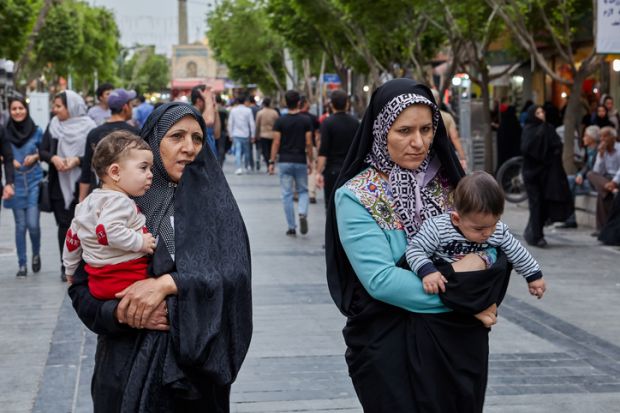In an effort to boost the size of the country’s population, Iran’s ministry of science has directed universities to reward professors who supervise pregnant students by allowing them to have larger research groups.
According to Iranian media, the directive obliges universities to give special dispensation to faculty members who oversee pregnant mothers and students who have children under two years of age. Such faculty will be permitted to take on an additional master’s or PhD student, according to reports.
Separately, Iranian universities are required to provide courses on home and family management for female students, and they are no longer allowed to promote any form of population control.
The nation has seen childbirth rates fall in recent decades – to 1.9 children per woman in 2019, down from 6.5 children in the 1980s.
In recent years, Iran’s conservative government has taken a hardline stance on abortion, and the country’s parliament also passed legislation in 2020 banning public hospitals from performing vasectomies. In both cases, the law is in theory flexible if a woman’s life is at risk from pregnancy, but critics say the moves have led women to seek dangerous underground abortions.
Encieh Erfani, until recently an assistant professor of physics at Zanjan’s Institute for Advanced Studies in Basic Sciences before her resignation because of the recent anti-government protests, said she was sceptical the new policy would do much to help female students or their professors.
“Saying each faculty member should support students if they’re pregnant is just propaganda,” she said, adding that supervising more students – which was portrayed as a reward for faculty for supervising young mothers – seemed like the opposite of an incentive.
“I do not understand how this extra work can be considered a promotion,” she said.
Dr Erfani recalled courses she once had to take on family planning when she was doing her own bachelor’s degree, back when Iran was promoting population control after a post-revolution baby boom: “The funny point is that, for this course, most of the lecturers were mullahs [religious scholars]…they tried to advertise family structure [per] Islam.”
Recent moves to make higher education more accommodating for women had also fallen flat, Dr Erfani said. Under Iran’s former president, Hassan Rouhani, the government put in place a policy requiring each university to employ an adviser on female and family matters – but it hadn’t made academia more welcoming, she said: “To be honest, in the last six years nothing has changed.”
While it is commonplace in European countries to give scholars extra time to fulfil publication or teaching requirements in order to be considered for tenured positions, Iran has no such rules. Although its laws officially give women – including female faculty members – nine months of maternity leave, in practice they rarely take it, according to Dr Erfani.
Women “are always worried that, if they leave for nine months, their jobs will be given to [other people]”, she added. “So they take three months.”
The majority of institutions also lacked infrastructure to support female faculty, she added, noting that creches and childcare facilities common in many Western institutions were a rarity in Iran.
Dr Erfani said she worried that the new policy would “put more pressure on faculty members” to accept pregnant students and then give them higher grades.
Register to continue
Why register?
- Registration is free and only takes a moment
- Once registered, you can read 3 articles a month
- Sign up for our newsletter
Subscribe
Or subscribe for unlimited access to:
- Unlimited access to news, views, insights & reviews
- Digital editions
- Digital access to THE’s university and college rankings analysis
Already registered or a current subscriber? Login








